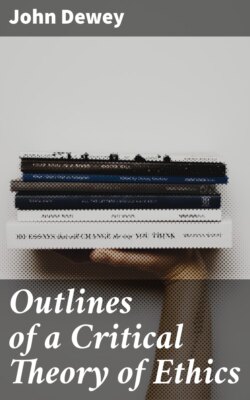Читать книгу Outlines of a Critical Theory of Ethics - Джон Дьюи - Страница 12
На сайте Литреса книга снята с продажи.
VIII.
ОглавлениеCharacter and Conduct.
We have seen that the moral sentiments, or the moral disposition (distinguished from the feelings as passing emotions), on one side, and the consequences as ideal or conceived (distinguished from the consequences that, de facto, result), on the other, both have moral value. If we take the moral feelings, not one by one, but as a whole, as an attitude of the agent toward conduct, as expressing the kind of motives which upon the whole moves him to action, we have character. And just so, if we take the consequences willed, not one by one, but as a whole, as the kind of end which the agent endeavors to realize, we have conduct. Character and conduct are, morally, the same thing, looked at first inwardly and then outwardly. Character, except as manifest in conduct, is a barren ideality. Our moral judgments are always severe upon a man who has nothing to show but 'good intentions' never executed. This is what character comes to, apart from conduct. Our only way of telling the nature of character is the conduct that issues from it. But, on the other hand, conduct is mere outward formalism, excepting as it manifests character. To say that a man's conduct is good, unless it is the manifestation of a good character, is to pass a judgment which is self-contradictory.
See Alexander, Op. cit., pp. 48-50 and p. 39.
From this point of view we are enabled to identify the two senses of motive already discussed—the ideal of action and the moving feelings. Apart from each other they are abstractions. Cæsar's motive in crossing the Rubicon may have been 'ambition,' but this was not some bare feeling. It was a feeling of ambition produced in view of the contemplation of a certain end which he wished to reach. So a boy's motive in striking a playmate may be anger, but this means (if the act is anything more than one of blind physical reaction) an anger having its conscious cause and aim, and not some abstract feeling of anger in general. The feeling which has its nature made what it is by the conceived end, and the end which has ceased to be a bare abstract conception and become an interest, are all one with each other.
Morality is then a matter pertaining to character—to the feelings and inclinations as transformed by ends of action; and to conduct—to conceived ends transformed into act under the influence of emotions. But what kind of character, of conduct, is right or realizes its true end? This brings us to our first problem.
